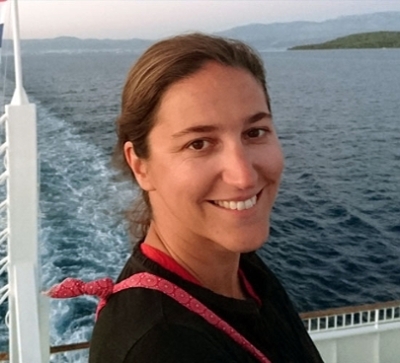Professor Spotlight: Dr. Ana Sirovic

Dr. Ana Sirovic is a new addition to the Marine Biology Department here at Texas A&M University - Galveston with her expertise in marine bioacoustics.
Where did you attend college? And what did you major in?
B.A. at the University of California, Santa Barbara in Creative studies
Ph.D. at the University of California, San Diego in Oceanography
Where did you previously work?
I did a postdoc with NOAA's Southwest Fisheries Science Center in La Jolla, California developing novel acoustic techniques to estimate abundance of rockfishes. After that I was a professor at Alaska Pacific University in Anchorage where I taught everything from introductory biology to fisheries science to marine bioacoustics. Before coming to TAMUG, I worked for eight years at the Scripps Institution of Oceanography where I studied marine mammal and fish acoustics and impact of sound on marine animals.
What is your current association with Texas A&M University at Galveston and why did you decide to work for this University?
I am currently an Associate Professor. I currently teach MARB 400 “Biology of Marine Mammals” and I have two graduate students, one Ph.D. and one M.Sc. student, who are also learning to use acoustics to study marine animals. I came to Texas A&M University at Galveston because it allows many opportunities for interdisciplinary science and collaborative work. It also offers a great jumping-off point for research in the Gulf of Mexico.
What is your teaching philosophy?
I believe students should learn how to make connections across topics and think holistically, which is why I like teaching interdisciplinary courses and look forward to offering a course on marine bioacoustics in the future. I also believe in a hands on approach to science and like to offer opportunities for students to learn by trial and error. Finally, I think it's essential for students to have writing skills, as writing offers a reflection of student's comprehension and clarity of thinking.
What research efforts are you a part of?
I am a Marine Bioacoustician, so I develop and use new technologies to study highly endangered marine species such as whales and fish. I also study the long-term trends in populations and impacts of sound on animals. My ultimate research goals usually work toward management-related solutions.
What advice do you have for students, especially those who are interested in pursuing research?
Advice I would offer to students is to be open minded and think practically when it comes to choosing what you would like to research. Many students come to me because they are interested in working with marine mammals, but my research involves a lot more than just observing them. Data analysis, statistics, or other quantitative skills are essential and will goa long way to show your real interest in science.